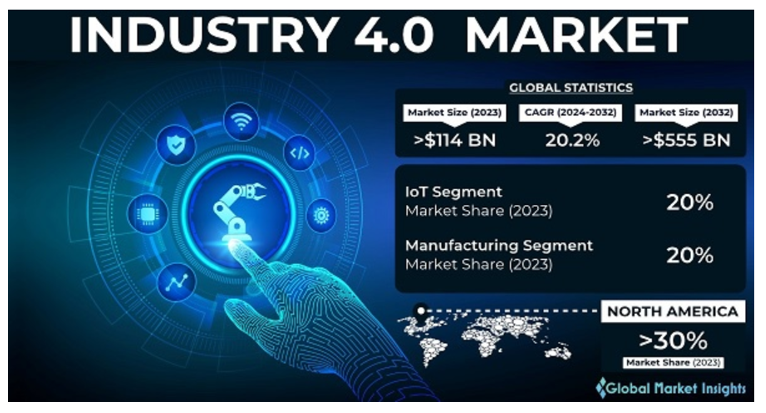4 Advancements in Industry 4.0 Bring New Investment Opportunities
 |
| By Jurica Dujmovic |
Today, I want to discuss an important, overarching and ongoing trend: Industry 4.0.
Never heard of it? Well, maybe not so directly. But it’s a trend you’ve surely witnessed: the transformation in manufacturing and industrial practices through the integration of digital technologies.
Industry 4.0 — also called the Fourth Industrial Revolution — is shaping up to be a significant market force, growing robustly due to the integration of digital technologies in manufacturing and industrial sectors.
As of 2023, the Industry 4.0 market was valued at approximately $114.3 billion and is projected to expand at a compound annual growth rate of over 20%, potentially reaching around $555.1 billion by 2032.

This all comes around to crypto through artificial intelligence.
The integration of AI into industrial operations isn't just enhancing efficiency; it's reshaping investment opportunities across sectors.
Here's a deeper look at four significant trends in this revolution … and key players behind each, offering a roadmap for savvy investors:
Industry Advancement 1: Digital Twin Technology
Simply put, a digital twin is a virtual representation of an object or system designed to reflect a physical object accurately. And itis increasingly becoming a cornerstone of Industry 4.0, particularly for industry giants like General Electric (GE) and Siemens.
These companies are harnessing this technology to create precise digital replicas of physical assets and systems, using machine learning and data analytics to provide detailed insights into asset performance and health.
Most notably, this allows for real-time monitoring and predictive maintenance. This enables companies to simulate different operational scenarios, predict outcomes and optimize processes without the risk and expense associated with manipulating physical assets.
GE, for example, uses digital twin technology across various sectors — including aviation, healthcare and power generation — to optimize the performance of equipment and predict maintenance needs.
This capability not only reduces downtime but also extends the life of the equipment, thereby enhancing operational efficiency and reducing costs.
Industry Advancement 2: AI-Driven Automation
Firms like Rockwell Automation (ROK) and ABB Ltd are at the cutting edge of AI-driven automation, using AI to streamline and enhance the efficiency of complex industrial processes.
Rockwell Automation integrates AI to optimize production lines and reduce operational downtime. By employing sophisticated algorithms, Rockwell's systems can predict equipment failures before they occur and suggest preventative maintenance schedules, thereby minimizing disruptions and extending machine lifespan.
Similarly, ABB Ltd harnesses AI to refine its robotic systems, enhancing its ability to perform tasks with greater precision and flexibility. ABB's robots are equipped with advanced vision systems and sensitive touch capabilities, enabling them to undertake more complex assembly tasks that were previously beyond the scope of automated solutions.
The AI-assisted innovations from these companies lead to substantial cost savings and improved outputs. This adaptability is key to maintaining high productivity rates and reducing waste, factors that directly correlate to improved profitability.
Industry Advancement 3: Supply Chain Management
AI is also significantly transformingsupply chain management within Industry 4.0, enhancing logistics efficiency through advanced capabilities such as predictive analytics and real-time decision-making.
Companies like SAP (SAP) and Oracle (ORCL) are at the forefront of this revolution.
SAP, for instance, integrates AI into its digital supply chain solutions, providing tools that predict and manage inventory levels more effectively, optimize routing for delivery vehicles and anticipate maintenance for equipment before breakdowns occur.
This predictive capability not only prevents costly downtime but also ensures a smoother flow of goods and materials.
Oracle on the other hand, offers features such as demand forecasting, supplier management and intelligent fulfillment. These allow businesses to anticipate market changes, adjust production schedules dynamically and fulfill orders more efficiently, all of which contributes to reduced overhead costs and enhanced service delivery.
By enabling more agile and transparent supply chains, AI helps companies respond more quickly to market demands and customer needs, effectively transforming traditional supply chains into adaptive supply networks.
This adaptability and agility are particularly valuable in today's fast-paced market environments, where delays and inefficiencies directly translate to lost opportunities and revenue.
Industry Advancement 4: Cybersecurity
This is the final field that, by necessity, is looking for solutions for an Industry 4.0 environment.
As Industry 4.0 advances, the integration of more Internet of Things and cloud computing into industrial operations significantly heightens the risk of cyber threats. As such, robust cybersecurity measures to safeguard sensitive industrial data and ensure operational integrity are mandatory.
Companies such as Palo Alto Networks (PANW) and Fortinet (FTNT) are leading the charge, developing advanced security solutions specifically tailored for Industry 4.0 environments.
Palo Alto Networks, known for its comprehensive security platforms, delivers solutions that protect the entire digital landscape of an organization, from edge devices to cloud systems. Their focus on preventing cyber-attacks through advanced threat detection and response mechanisms is critical for industries where a breach could lead to significant downtime or safety risks.
Fortinet, similarly, offers solutions designed to deliver high performance combined with deep visibility into network activities, which is essential for detecting and mitigating potential threats in real time.
For investors, the approach to capitalizing on Industry 4.0 should involve a keen analysis of companies that are not just adopting technology … but are also innovating and leading its application.
Looking at firms that have strong fundamentals and are pioneering in AI applications, cybersecurity enhancements and smart supply chain solutions will be key.
Monitoring the performance and market strategies of these companies will provide investors with insights into potential returns. By understanding these components and the overall dynamics of Industry 4.0, investors can make informed decisions on where to allocate resources to maximize their investment returns.
And there will be additional opportunities the more crypto AI projects are adopted and used by TradFi giants. In that case, you have a choice to invest in the company advancing Industry 4.0 … or in the projects that make the transformation possible.
The interplay of AI with traditional industrial sectors promises not only enhanced operational efficiencies but also opens up new pathways for creating value, making it an essential area for investor focus in the coming years.
I hope you’re ready.
Best,
Jurica Dujmovic

